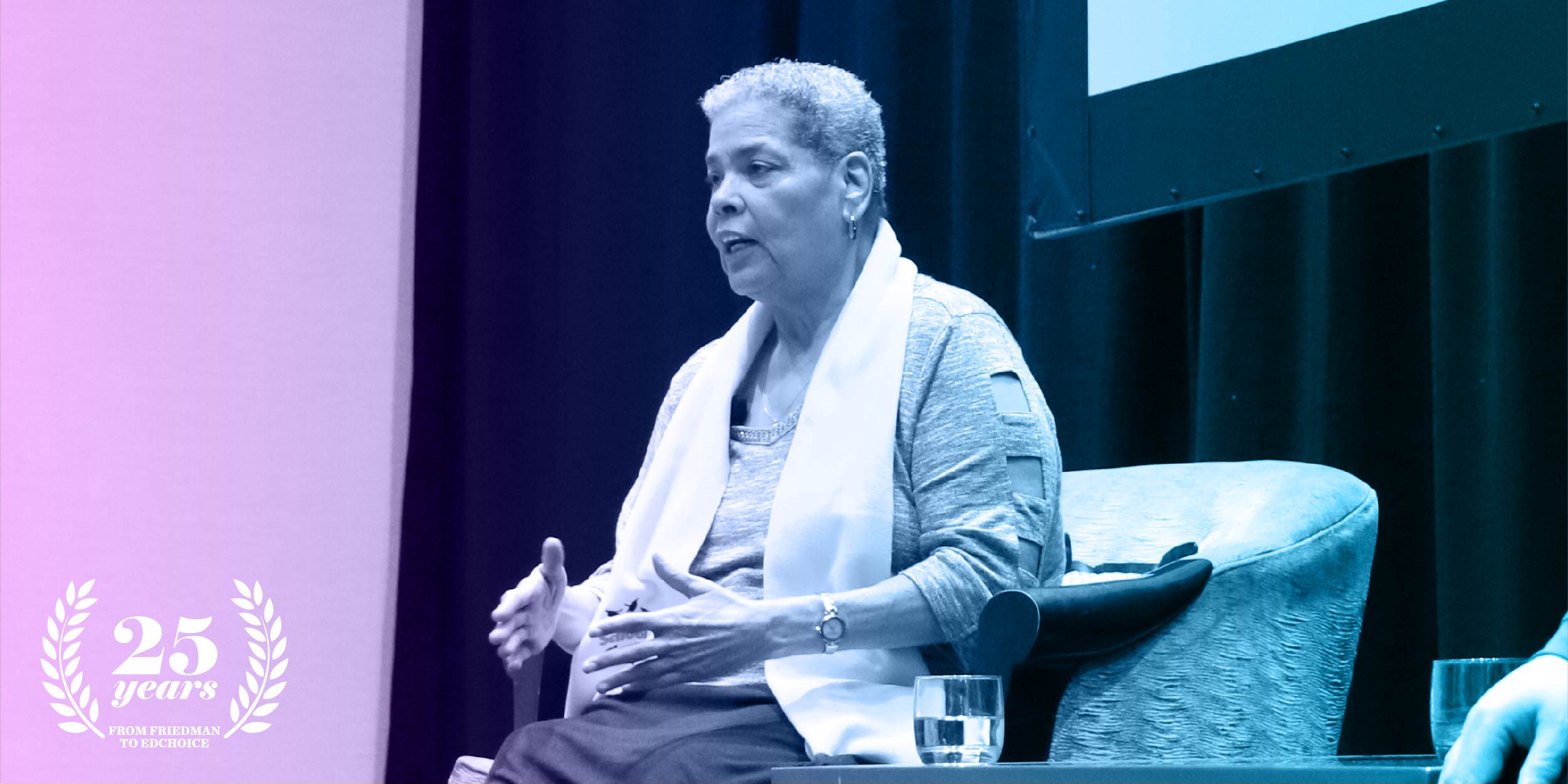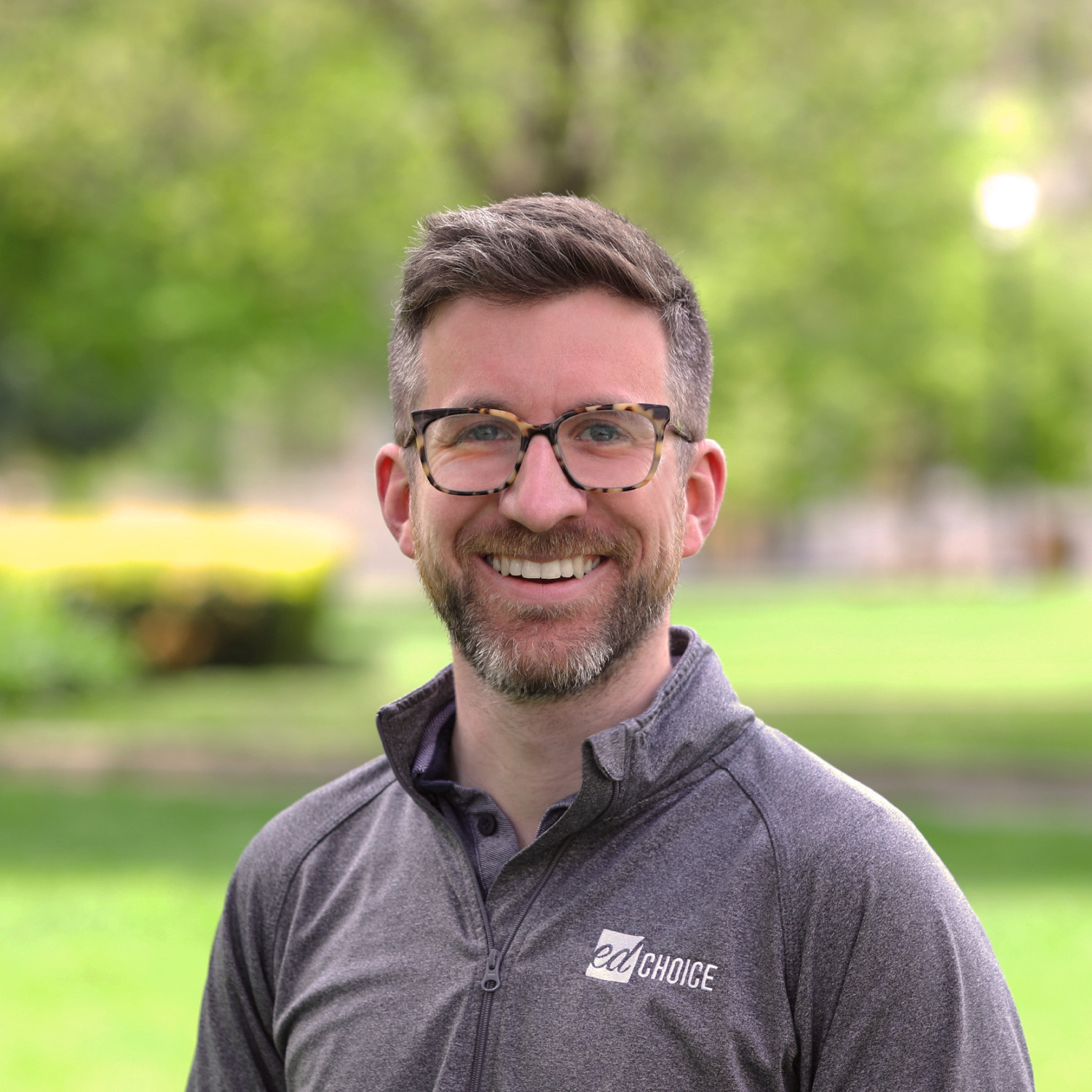Miss Virginia and Dr. Friedman
Virginia Walden-Ford was having a rough day. She had spent the morning and afternoon on Capitol Hill with a group of parents, lobbying congressional offices about a potential school voucher program for low-income students in Washington, D.C. She had not met with much success.
To add insult to injury, after getting her hopes crushed in the offices of elected representatives, she had to truck it across town to a reception in Georgetown for supporters she desperately needed to keep her scrappy advocacy operation going. On the drive over, she fretted that she might have to tell the hundreds of families that she had organized that they might lose.
She stood greeting people, trying to keep a brave face, when someone tapped her on the shoulder, telling her that she had a phone call.
“Who is it?” she asked.
“It’s Milton Friedman.”
***
Virginia grew up in Little Rock, Arkansas. Her parents were civil rights activists and educators. Her mother was one of the first Black educators to desegregate the teaching force of the Little Rock Public Schools. When her father was named the first Black assistant superintendent of the Little Rock schools, they came outside to find a cross burning in their front yard.
Virginia and her twin sister Harietta were part of the second wave of students to desegregate Little Rock High School, following in the footsteps of the Little Rock Nine. It was tough, and by the time she finished high school, she had had enough of being entirely surrounded by white people. She decided to attend college at the historically Black Hampton University.
Particularly for those of us of the localist bent, who believe in subsidiarity and the notion that the people who are closest to a problem generally understand it best and know best how to solve it: We have to find our Virginias. Too often, advocacy organizations show up to a community with what they want and find local people who will push it. Their policy prescriptions are the same whether they are in Phoenix or Pittsburgh.
Years later, when she was a single mother in Washington, D.C. she could see that her son was not getting a good education at his local public school. Her two older children had done well in school, but her baby was more interested in the trappings of the streets than the classroom. She scrimped and saved to get him into a private school that could give him the structure and attention that he needed, but the burden was too heavy to bear.
Starting in the late 1990s, she started to organize parents in Washington, D.C., to fight for state support to send their children to private schools. Quite by accident, she found herself in the center of a long simmering debate around school vouchers, and Washington, D.C., became a flashpoint for that struggle.
Milton Friedman is frequently credited as the “father” of school vouchers due to his influential 1955 essay “The Role of Government in Education.” While it is true that he provided an intellectual framework for public policy designed to put parents in charge of where their children attend school, state support of private education has a very long history in America. Thomas Paine proposed a voucher-like program to fund education in The Rights of Man in 1791. Small towns in Maine and Vermont started “tuitioning” programs that paid private school tuition for children in areas without public schools starting in the 1860s.
Throughout the 1960s and 1970s, school choice programs were as much a part of thinking on the left as the right. As detailed by Ron Matus in his fantastic series “The Voucher Left” everyone from Harvard Graduate School of Education Dean Ted Sizer to politicians like George McGovern, Daniel Patrick Moynihan, Hubert Humphrey and Jimmy Carter backed state support for families attending private schools.
Private schooling has a proud tradition in the African-American community, as well. Mary McLeod Bethune started what became the Bethune-Cookman School in Daytona Beach, Fla., in 1904. Dr. William James Edwards started the Snow Hill Normal and Industrial Institute in Snow Hill, Ala., in 1893. The list goes on. These schools existed as oases of excellence dotting the bleak landscape of our segregated education system.
Unfortunately, none of this history has helped keep vouchers and other forms of state support for families of private school students out of the pig sty that is American politics. That mucky milieu is precisely where Virginia found herself in the waning years of the 20th Century.
The story of Virginia’s reluctant educational advocacy is told in the movie Miss Virginia, starring Orange is the New Black’s Uzo Aduba as Virginia, Matthew Modine as the Republican congressman who becomes her champion, and Vanessa Williams as the television host who questions her sincerity. Virginia maintains that the movie did a great job telling her story.
The movie ends in triumph with Virginia leading thousands of Washington, D.C., families in a march to the Capitol to lobby for the voucher program and watching the successful House vote from a jail cell after getting arrested at the demonstration. The real-life program dramatized in the movie is the D.C. Opportunity Scholarship Program, a program that thousands of D.C. children have used since its inception.
***
When Virginia put the phone to her ear, Milton Friedman, Nobel Laureate and free-market devotee, said: “I just want to tell you how proud I am of you. Don’t give up. Keep fighting.”
When she tells the story today, Virginia contends that the only other person who have touched her heart in the same way in that moment would have been her father.
“I will never forget the words he said to me or what they meant to me,” she said. “That was one of the reasons I kept fighting.”
Over the final years of Milton Friedman’s life, he and Virginia formed a small mutual admiration society.
They met on multiple occasions. To Virginia, he was a quiet, peaceful and calm person. Very small in stature, when he started to speak, he became a giant. “He was someone I could really talk to,” she said, referring to him as a grandfather figure and a wise professor.
Whenever they would meet, the two would exchange pleasantries, but then, as Virginia puts it “we’d put our heads together and really start talking.” She adored their conversations: “I wanted to talk to him as long as I was able.” She said that he made her feel important, he listened to what she had to say. After their conversations, she felt invincible.
“When I think about all of the people in my life who’ve made me who I am,” she says, “Dr. Friedman is one of them.”
***
Virginia has since moved back to Little Rock, but she stays in touch with her friends in D.C. As she likes to say, there are still lots of folks in the District who call her “Momma” or “Grandmomma.” She speaks around the country about parental empowerment and the rights of parents to determine the best education for their child. She stands up for those without a voice—for the proverbial little guy.
Milton Friedman, the little guy who became a giant, offers a beautiful lesson for those of us who advocate for social change. True support is based in respect. It was abundantly clear the respect he had for Virginia. He didn’t talk at her. He listened to her. He didn’t abandon her when the odds were long. He stuck by her side. He did not see her as some instrument for his desired social change. He saw her in her totality as a human being, and he said, “I’ve got her back.”
Particularly for those of us of the localist bent, who believe in subsidiarity and the notion that the people who are closest to a problem generally understand it best and know best how to solve it: We have to find our Virginias. Too often, advocacy organizations show up to a community with what they want and find local people who will push it. Their policy prescriptions are the same whether they are in Phoenix or Pittsburgh.
Milton Friedman showed us a better way. Find the people who are already doing the work and stand with them. Help them up when they fall. Amplify their voices. Listen to them. Respect them. This might mean tweaking the policies that you support to take local context into account. The ends—whether they are educational freedom, economic growth or anything else—can remain the same, but the means might need to be flexible.
As we look across the country and hear loud cries for social change, there are roles for today’s Dr. Friedmans and Miss Virginias. More partnerships like theirs are sorely needed.





